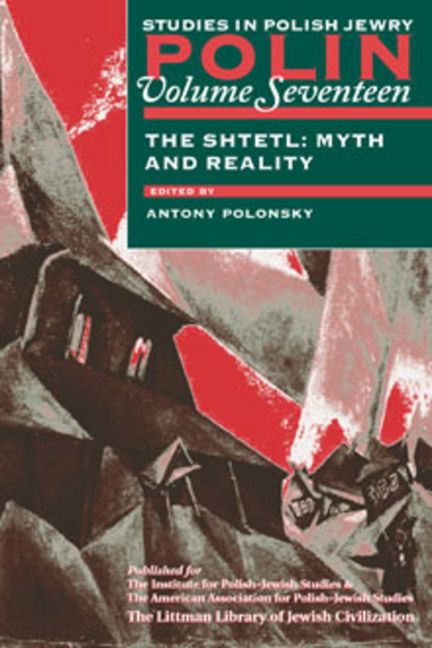Book contents
- Frontmatter
- Dedication
- Editors and Advisers
- Preface
- Polin
- Polin: Studies inPolish Jewry
- Contents
- Note on Place Names
- Note on Transliteration
- List of Abbreviations
- PART I THE SHTETL: MYTH AND REALITY
- PART II NEW VIEWS
- PART III DOCUMENTS
- PART IV THE SIXTY-FIFTH ANNIVERSARY OF EVENTS IN PRZYTYK: A DEBATE
- PART V REVIEWS
- Chone Shmeruk, Hakeriyah lenavi: meḥkerei historiyah vesifrut, edited by Israel Bartal; Chone Shmeruk, Ayarot ukerakhim: perakim beyetsirato shel shalom aleikhem, edited by Chava Turniansky
- Anna Michałowska, Między demokracją oligarchią: Władze gmin żydowskich w Poznaniu i Swarzędzu
- Magdalena Sitarz, Yiddish and Polish Proverbs: Contrastive Analysis Against Cultural Background
- Shmuel Feiner and David Sorkin (eds.), New Perspectives on the Haskalah
- Brian Porter, When Nationalism Began to Hate: Imagining Modern Politics in Nineteenth-Century Poland
- Irena Janicka-Świderska, Jerzy Jarniewicz, and Adam Sumera (eds.), Jewish Themes in English and Polish Culture
- Nancy L. Green (ed.), Jewish Workers in the Modern Diaspora
- Gertrud Pickhan, ‘Gegen den Strom’. Der Allgemeine Jüdische Arbeiterbund ‘Bund’ in Polen, 1918–1939
- Anna Cichopek, Pogrom Żydów w Krakowie, 11 sierpnia 1945 r.
- Michał Horoszewicz, ‘Przez dwa millenia do rzymskiej synagogi’: Szkice o ewolucji postawy Kościoła katolickiego wobec Żydów i judaizmu
- OBITUARIES
- Notes on the Contributors
- Glossary
- Index
Anna Cichopek, Pogrom Żydów w Krakowie, 11 sierpnia 1945 r.
from PART V - REVIEWS
- Frontmatter
- Dedication
- Editors and Advisers
- Preface
- Polin
- Polin: Studies inPolish Jewry
- Contents
- Note on Place Names
- Note on Transliteration
- List of Abbreviations
- PART I THE SHTETL: MYTH AND REALITY
- PART II NEW VIEWS
- PART III DOCUMENTS
- PART IV THE SIXTY-FIFTH ANNIVERSARY OF EVENTS IN PRZYTYK: A DEBATE
- PART V REVIEWS
- Chone Shmeruk, Hakeriyah lenavi: meḥkerei historiyah vesifrut, edited by Israel Bartal; Chone Shmeruk, Ayarot ukerakhim: perakim beyetsirato shel shalom aleikhem, edited by Chava Turniansky
- Anna Michałowska, Między demokracją oligarchią: Władze gmin żydowskich w Poznaniu i Swarzędzu
- Magdalena Sitarz, Yiddish and Polish Proverbs: Contrastive Analysis Against Cultural Background
- Shmuel Feiner and David Sorkin (eds.), New Perspectives on the Haskalah
- Brian Porter, When Nationalism Began to Hate: Imagining Modern Politics in Nineteenth-Century Poland
- Irena Janicka-Świderska, Jerzy Jarniewicz, and Adam Sumera (eds.), Jewish Themes in English and Polish Culture
- Nancy L. Green (ed.), Jewish Workers in the Modern Diaspora
- Gertrud Pickhan, ‘Gegen den Strom’. Der Allgemeine Jüdische Arbeiterbund ‘Bund’ in Polen, 1918–1939
- Anna Cichopek, Pogrom Żydów w Krakowie, 11 sierpnia 1945 r.
- Michał Horoszewicz, ‘Przez dwa millenia do rzymskiej synagogi’: Szkice o ewolucji postawy Kościoła katolickiego wobec Żydów i judaizmu
- OBITUARIES
- Notes on the Contributors
- Glossary
- Index
Summary
In recent years the problem of anti-Jewish violence committed by Poles during the Second World War and particularly in its immediate aftermath has attracted the attention of a number of scholars. Among the most widely discussed works is the recent study by Jan T. Gross. Some of these studies set out to analyse patterns in anti-Jewish violence by Poles. Joanna Michlic-Coren has compared anti-Jewish violence and rhetoric in the aftermath of the Holocaust with pre-war pogroms. David Engel has compared and contrasted post-Second World War anti-Jewish violence with political murders of Poles. Anna Cichopek's book Pogrom Żydòw w Krakowie, 11 sierpnia 1945 r., belongs to a different historical genre—one that focuses on a single case-study and attempts to reconstruct as detailed an account of the events as the available sources make possible. Her research bears fruit as she reconstructs the events that took place in Krakow on 11 August 1945.
While anti-Jewish violence is mentioned in numerous historical studies of the period immediately following the liberation of Poland, and the various Jewish testimonies and memoirs devote much attention to the Jewish survivors’ lack of physical security, relatively little material has been available on the pogrom in Krakow—the first to occur in Poland after the Holocaust. Cichopek's book successfully fills this gap, bringing to our attention numerous archival sources. Moreover, her research allows us to compare the events in Krakòw with the most thoroughly studied pogrom of all, the one that took place in Kielce on 4 July 1946. Though some questions remain unanswered, Cichopek's reconstruction of the events points to a number of interesting similarities to the historical narrative of the Kielce pogrom—particularly as presented by Bożena Szaynok. Cichopek points out that the pogroms in Kielce and Krakòw share numerous characteristics, and that the only significant difference seems to have been in the scale of events.
Cichopek conducts thorough research and brings together numerous details on the dynamics of the pogrom and its immediate aftermath that were not presented in previous studies by Marc Hillel, Zdzisław Zblewski, Julian Kwiek, and Jan T. Gross.
- Type
- Chapter
- Information
- The Shtetl: Myth and Reality , pp. 440 - 448Publisher: Liverpool University PressPrint publication year: 2004

